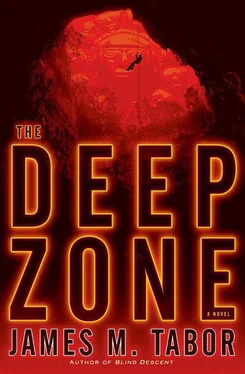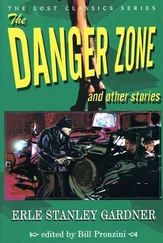“So how ’bout SEALs and Deltas and such? Those black ops guys.”
“SEALs and Deltas are the best warfighters in history, but supercaves are one of the few environments they’re not trained for.” As Bowman said this, Hallie thought, Well, then, bet he was a Delta . She had never known any, but he fit pretty well her vision of one. Except for the “doctor” part. What exactly is he a doctor of?
“Then how in hell’re y’all gonna get us in there?”
“Stealth insertion.” Bowman bit off his words in short bursts. “Tomorrow night. No moon. Our good luck. Already planned. Assets staged. Ready to deploy.”
With all of that laid out, it felt like those moments after a brutal fifteen-round fight when all anyone can do is wait for the decision. Nobody spoke. Haight had untied the ponytail and was running fingers through his blond hair. Al Cahner was looking at his hands. Arguello was tapping an index finger on the table. Bowman sat perfectly still, watching them all. Hallie noted that he was missing the tip of his left little finger.
Haight cleared his throat, spoke: “So let me make sure I understand. Y’all are lookin’ at a catastrophe of biblical proportions. You pulled together a group of total strangers helter-skelter. Nobody but presumably Dr. Bowman has, ah, security experience. But y’all would have us sneak into the middle of a vicious drug war, penetrate one of the deepest caves on earth, retrieve stuff that probably won’t survive the trip out, and then sneak back through the war zone, hopin’ all the while that pissed-off, murderin’ natives don’t shoot us with poison arrows or blowguns or whatever. I don’t work for the government, nor, apparently, do Drs. Leland or Arguello. Since y’all haven’t said anything about payment, this obviously will all be from our patriotic fervor and the goodness of our hearts. Is that about the size of it?”
There had been an expectant pressure in the room, tension generated by crisis and challenge, Lathrop and Barnard working it, shaping it up to a climax. This, clearly, was not the one they had hoped for. The phone in Lathrop’s jacket pocket vibrated over and over. He seemed not to notice. Barnard’s head and eyes and shoulders drooped, like the top stories of a building keeling over slowly, reluctantly, resisting the downward pull to the very last. Barnard was not the kind of man who spent a lot of time looking at the floor. Hallie did not like what was happening here.
She glanced around the table. No one met her eyes except Bowman—who, she got the feeling, had been watching her first. Al Cahner was chewing a cookie, slowly, thoughtfully, as though it might be his last. Arguello was still tapping one finger on the table, rhythmically, as though to a song only he could hear. Bowman sat perfectly still, eyes locked with Hallie’s. Having grown up with two brothers and a soldier father, Hallie had become very good at staring matches. The urge to look away was deeply instinctual, like the urge to gasp in air after a long bout of breath holding, but Hallie would not quit first. Seconds passed. Finally, Bowman pointed an index finger at her, mouthed the words You win , and looked away.
For his part, Lathrop appeared to know quite well what happened in Washington to those who carried bad news to high places. The phone vibrated again. He ignored it.
“I’m afraid that is about the size of it, Dr. Haight.”
“Sounds like a pretty desperate thing.” Haight looked from Lathrop to Barnard.
“We would be lying if we suggested otherwise.” Barnard, returning his gaze directly.
Something had been building in Hallie, and she could contain it no longer. Bowman had distracted her, but now she stood up so quickly her chair tipped over backward and hit the floor with a bang. The door opened and the security officer stood there, surveying. Lathrop waved him back out.
“God damn it.” Beneath the deep tan, Hallie’s face was reddening. “How often do you get the chance to save thousands—maybe millions —of people from horrible deaths? We have just been offered the opportunity of a lifetime, gentlemen.”
“We have to be clear, Dr. Leland,” said Lathrop, “so there is absolutely no misunderstanding. People could die on this mission. It is, as Dr. Haight observed, a desperate thing.”
In her head, Hallie heard her father’s voice: Every day, every single thing you do writes a page in the book of your life. You can write them, but you can never change them .
“We could die driving to work and what good does that do anybody? But we’re not going to die. We are going into that cave to get the moonmilk.”
Ron Haight shook his head, laughed out loud. “Hell, this is the best deal I been offered for an ol’ coon’s age. Savin’ people is what I do for a livin’. Hallie’s right. I’m in like Flynn, y’all.”
Arguello’s index finger landed on the table and stopped. He arranged his face, swallowed, spoke formally. “When my time comes, I do not want to look back on this day and feel shame. I am going.”
Al Cahner reached for another chocolate cookie. “I always intended to go.” His voice was calm, confident. “It was never in question.” The steel there surprised Hallie. It was not something she had heard during their time working together.
They all looked at Lathrop. He stared back, expressionless for a few seconds. Then he raised his coffee cup in salute.
“Lady and gentlemen, we have a team.”
Hallie cut her gaze from Lathrop to Bowman. He winked, the movement nearly imperceptible, accompanied by the tiniest crinkling at the corners of his mouth. The wink and crinkles could have meant anything, but in Hallie’s mind they caused these words to form: Thank you .
For his part, Lathrop looked like a man whose death sentence had just been commuted.
There followed a few long moments of silence as the full significance of their decisions sank in. Then Bowman turned to Hallie.
“You’ve been there. What can you tell us about the cave?”
She looked to Barnard, who nodded, and then she got up and walked to a whiteboard at the front of the room.
“Dr. Haight’s probably the most experienced, but we’ve all been in big caves. Here’s the thing, though. Cueva de Luz isn’t a cave. It’s a supercave .”
She drew a line that plunged from the board’s top left corner toward the bottom right corner with a lot of small, jagged steps in between. It looked like the graph of a badly failing business’s cash flow.
“Cueva de Luz’s profile. About five thousand vertical feet deep. A bit more than four miles from entrance to the cave’s known terminus.”
“ Known terminus. So there is more unexplored terrain beyond that point?” Arguello asked.
“It keeps going and going. No one knows how far. We could tell that because wind was ripping up from somewhere deep beyond the place we stopped. Right after the mouth, this cave gets vertical quickly, so we’ll pass through the twilight zone fast. Before you know it, the dark zone just ambushes you. And because of its size and depth, this cave has a special zone not identified in other caves. It’s called the deep zone.”
“Is that name because the terrain down there is different?” Arguello wanted to know.
“You’re much deeper, so the watercourses are bigger, but it has more to do with the psychological impact,” Hallie said. “You know that every human body has a unique response to altitude in the mountains, right? Depth and darkness don’t affect the body that way, but they do the brain. Scientists have studied the phenomenon. Some believe it’s neurochemistry. Down there, the brain knows it’s a mile or whatever from the surface and doesn’t like how that feels. Self-preservation is the oldest, strongest instinct. The brain will do weird things to keep its body alive, like drive a person to fatal panic. When that happens we call it the Rapture.”
Читать дальше












